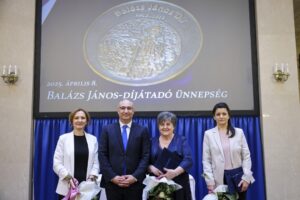
Students and families with pre-school children living in the neighboring countries can apply for the subsidy.Continue reading

Supporting national minorities, including Roma culture, means strengthening Hungary, as the Roma community is not a separate group, but an integral part of the nation, said Attila Sztojka, State Secretary for Social Opportunities and Roma Relations at the Ministry of Interior, at an awards ceremony held in Budapest on Tuesday to mark International Roma Day.
At the presentation of the Balázs János Awards, Mr. Sztojka stated that the international day of Roma culture is a celebration of “our language, our music, our dances, and our traditions.” He emphasized that this culture deserves attention and added that “the existence of a community also depends on how deeply it lives by its own values.”
The State Secretary recalled that
54 years ago, when the International Romani Union was founded, the focus was not on differences, but on shared human values, dignity, and peace.
“At that moment, it was declared: there is a shared identity, a set of values, and a common future,” he stressed.
Sztojka said that this legacy is still with us today, and it is our responsibility to ensure that there is something to pass on. “Culture is not a relic preserved in a display case — it is the pulse of our present, the soaring of our children, and the binding force of our families,” he said, adding that culture cannot exist without a community, without people who carry, protect, showcase, and pass on what is valuable.

Éva Horváth (L), Attila Sztojka (L2), Mrs. Jakab Engert (R2), Rita Kállai (R); Photo: MTI/Hegedüs Róbert
He also highlighted that the government provides financial support to Roma culture. As an example, he mentioned the 1.1 billion forints (2.69 million euros) allocated to the Musical Hungary program and the 770 million forints (1.88 million euros) dedicated to supporting cultural summer camps for Roma minorities, a 50% increase compared to last year. He emphasized that
Roma culture must not only be preserved but also appreciated, showcased, and those who work daily to uphold it must be rewarded.
The Balázs János Award serves this purpose — it recognizes those who do not merely talk about uplifting the Roma population in Hungary, but act to make it a reality. “This award does not judge based on origin, but on actions taken for the community and for strengthening coexistence,” he said. Speaking about the award’s namesake, Sztojka noted that the work of painter János Balázs reflects the mysticism, will to live, depth, and joy of Roma life — and also contains elements of Hungarian culture.
This year’s honorees were Éva Horváth, editor and presenter responsible for Roma programming at MTVA (Media Support and Asset Management Fund), Rita Kállai, director of the “Presence House” program in Budapest’s 9th district, and Jakabné Engert, Deputy Mayor of Kecskemét.
Via MTI; Featured picture: Pixabay